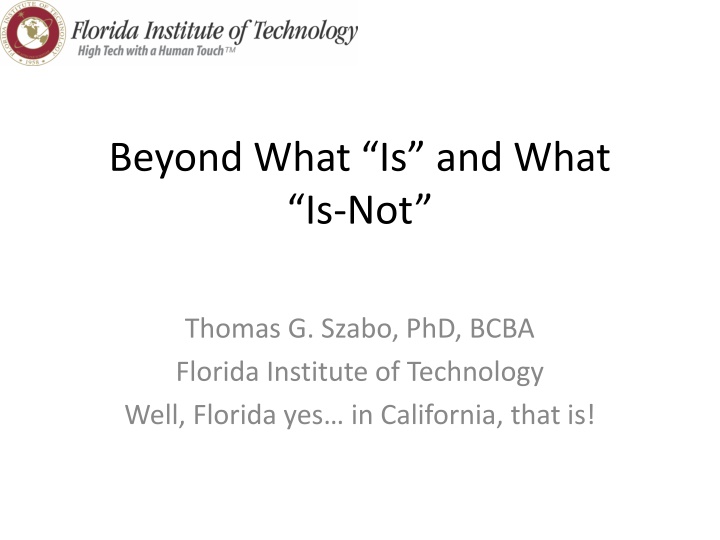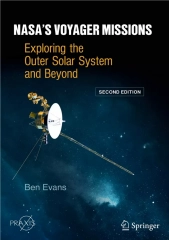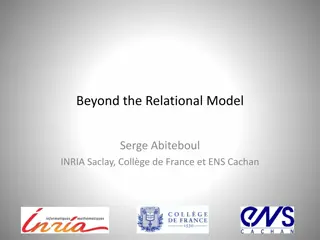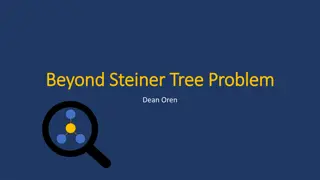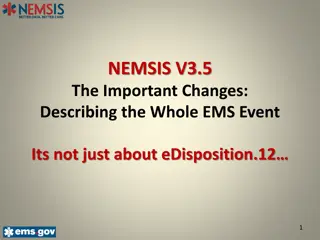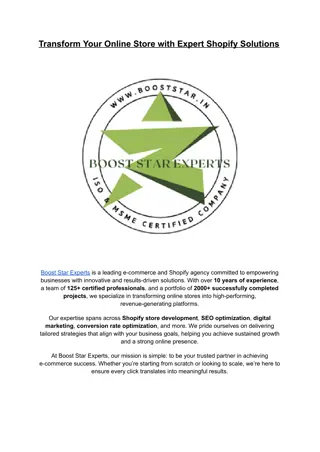Beyond What Is and What Is Not
In this insightful text, Dr. Thomas G. Szabo delves into the concept of object identity and perception, highlighting the subjective interpretation of entities based on context. Through engaging examples like a pencil to a dog's plaything, the narrative explores the dynamic nature of categorization and the role of human-environment interaction. The discussion shifts towards behavior analysis, emphasizing behavior as a product of the organism-environment relationship. This holistic perspective challenges traditional notions of objectivity and emphasizes the contextual nature of our understanding.
Download Presentation

Please find below an Image/Link to download the presentation.
The content on the website is provided AS IS for your information and personal use only. It may not be sold, licensed, or shared on other websites without obtaining consent from the author.If you encounter any issues during the download, it is possible that the publisher has removed the file from their server.
You are allowed to download the files provided on this website for personal or commercial use, subject to the condition that they are used lawfully. All files are the property of their respective owners.
The content on the website is provided AS IS for your information and personal use only. It may not be sold, licensed, or shared on other websites without obtaining consent from the author.
E N D
Presentation Transcript
Beyond What Is and What Is-Not Thomas G. Szabo, PhD, BCBA Florida Institute of Technology Well, Florida yes in California, that is!
I am holding a #2 lead pencil in my hand. Im rolling the pencil in my fingers and wiggling it between my index and middle fingers. What is it this thing in my fingers? A pencil, right? Say it out loud. Pencil.
But not to my dog. To my dog, this is a plaything. It s a toy to wrest from my hand, to run with, and to invite me to chase with him.
Just try and convince him otherwise, without offering him an alternative. Good luck with that.
This thing functions for me as a pencil in a particular context, thus I characterize it that way based on my use of it. At the same time, others might experience it and characterize it differently. Thus, it is the relation that we have with a thing in context that gives it its identifiability, not any innate thingness within it. PENCIL PLAYTOY
In CBS and behavior analysis writ proper, our fundamental unit of analysis what we aim to understand, predict, and influence is and has always been behavior, which we say is a function of the relationship between organism & environment.
We have never concerned ourselves simply with organism or environment. Said differently, we are concerned with the situated act in context genetic, historical, and current. Change any factor and you change the event of interest to us.
Since it is the event that we consider to be of importance, and not any particular thing in and of itself that influences the event, we say that we have no horse in the race regarding the independent ontological status of those things.
But a problem emerges with respect to the event that characterizes our relation as a science with scientists from other disciplines. That relation may be said to be a focus that interests us, but can we legitimately argue that our existence independent of that relation has no ontological existence? Other Disciplines CBS
This question is complicated. The short answer is that we have no scientific interest, no pragmatic use for taking a stand on what things exist independently of other things. We are interested in functional relations between things.
The independent status of these things, or the dividing line where one thing ends and the other begins, is arbitrary. The whole of the natural world is divided into arbitrary categories simply for the sake of deriving useful functional relations that allow us to take effective action. In other words, our interest in the connection between things and events is an interest in the relation between parts of an undifferentiated whole, the world, that we parse into units that suit our pragmatic and analytic purposes.
And importantly, we are unable to examine the existence of a thing outside of a relation to ourselves. How would we go about doing that? Any experience of other is committed by self with respect to other. Said differently, YOU exist only in relation to an I, and I exist only in relation to YOU.
Then how do we respond when scientists from other disciplines posit that functional contextualism (FC) does have an ontology and that FC is a kind of thing that exists? In other words, can other scientists looking at us in relation to their own discipline experience us as having an ontological status?
Here is where the answer gets tricky: I d argue yes, they can. And, I d say that it is legitimate for them to do so, from their perspective. After all, doesn t the dog experience the pencil as a plaything? Doesn t the writer experience the pencil as an implement with which to write?
So, yes! Others can (and do) experience FC as a thing that exists independent of other things and events. This brings us to a central tenet of the a- ontological position:
You can have an experience that is, for you, quite real, but that does not make your interpretation of that experience real. The truth is not within the interpretation, is not exemplified by the interpretation, nor is the truth found in the thing being examined by itself, in and of itself.
The truth, written with a lower case t, is found in the immediate and historical, dynamic, and fluid interplay or relation between the thing and the context in which it is evaluated.
But this interest of ours in the relation between things and events rather than in the status of things in and of themselves makes us unique in the world of science. In this regard, we are not like other natural sciences.
And in particular, if we seek to engage with other philosophers of science, we have a problem should we care about the fact that from their perspective in evaluating FC as a thing to be evaluated in and of itself, we are not without an ontology.
From their perspective, our ontology is a statement about being that involves relation with others. To them, our ontological statement is that there is no I without YOU, no HERE without THERE, no NOW without THEN. It is also an ontological statement from the vantage of metaphysics, the branch of philosophy in which ontology is situated.
Further, and again from the vantage of mainstream analytic philosophy, the ontological viewpoint of functional contextualism is that what IS can be an IS only in the context of OTHER and that it is of no bearing whether IS or OTHER have independent existences, in and of themselves. This is distinct from the perspective that what IS can be an IS only in the context of WHAT IS NOT.
That latter ontological viewpoint characterizes most of Western philosophy, and is so embedded in our languaging about everything that others find it laughable that we should exempt ourselves from the discussion as to the existence of things in and of themselves.
My point, a point I consider to be consistent with FC, can be distilled to this: ontology is a word used by people, it is not a thing in and of itself. If it can be helpful to us in building relations with other scientists to use the language of ontology to identify ourselves, then we might choose within that context to do so.
Just as I honor the experience of the dog with respect to my pencil and do not wave it in front of him, just as I honor the experience of the religious client and speak with him as though God is in the room with us even though I myself have no experience of this god, when I speak with philosophers of science and scientists from other disciplines, I take pains to speak in their language.
This should come as no surprise to the behavior analysts in this room, and I think that CBS can learn something from our experience in the world of applied behavior analysis
When I am talking scientist to scientist, for the sake of precision, I speak in terms of SR- and SR+, SDs and MOs, plys, tracks and augmentals, Crels, Cfuncs, BIRRS and EERS. When I am talking to Aunt Sallie, I do not make her learn to speak precisely about the difference between negative and positive reinforcement. She doesn t need to learn our technical jargon. I speak with Aunt Sallie in Aunt Sallie language, to ensure that we communicate effectively.
An important corollary point regarding workability and CBS goals: CBS values communication and collaboration with others. We seek to extend our communication with other disciplines so long as this helps us to alleviate human suffering and advance human well being.
To the extent that communicating with scientists from other disciplines furthers these aims, talking as other scientists talk could be useful. To the extent that it does not further our pragmatic goals, then it might not be worth the effort. But let s suppose communicating with scientists from other disciplines will be useful, since we do not yet know that it will not
To communicate effectively with others, we can speak as if from an ontological stance. And we can in doing so, carefully explain our a-ontological position. Our aim in speaking as if from an ontological position is to be of maximum service to greatest number of people who might otherwise not listen to what we have to say. Not a bad reason for acting as if
But its awkward and challenging because if they are scientists and philosophers of science, we want to persuade them to see things our way. We want to teach them and convince them Hmm Sounds a lot like a beginner therapist trying to coach psychological flexibility inflexibly, doesn t it? The solution is to invite them in without pushing them too hard. It is challenging
But challenging as this is, it is in the end easier and way more effective than trying to convince my dog that the pencil is not a chew toy. Good luck with that.
Thank you, and let the questions that can t be answered begin! Tom Thomas G. Szabo, PhD., BCBA tszabo@fit.edu
